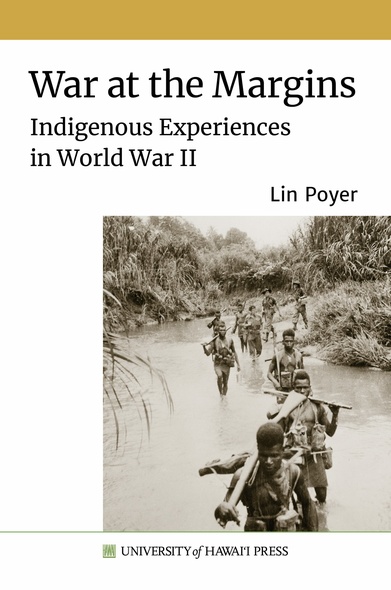Our shopping cart is currently down. To place an order, please contact our distributor, UTP Distribution, directly at utpbooks@utpress.utoronto.ca.

War at the Margins offers a broad comparative view of the impact of World War II on Indigenous societies. Using historical and ethnographic sources, Lin Poyer examines how Indigenous communities emerged from the trauma of the wartime era with social forms and cultural ideas that laid the foundations for their twenty-first-century emergence as players on the world’s political stage. With a focus on Indigenous voices and agency, a global overview reveals the enormous range of wartime activities and impacts on these groups, connecting this work with comparative history, Indigenous studies, and anthropology.
The distinctiveness of Indigenous peoples offers a valuable perspective on World War II, as those on the margins of Allied and Axis empires and nation-states were drawn in as soldiers, scouts, guides, laborers, and victims. Questions of loyalty and citizenship shaped Indigenous combat roles—from integration in national armies to service in separate ethnic units to unofficial use of their special skills, where local knowledge tilted the balance in military outcomes. Front lines crossed Indigenous territory most consequentially in northern Europe, Southeast Asia, and the Pacific Islands, but the impacts of war go well beyond combat. Like others around the world, Indigenous civilian men and women suffered bombing and invasion, displacement, forced labor, military occupation, and economic and social disruption. Infrastructure construction and demand for key resources affected even areas far from front lines.
World War II dissolved empires and laid the foundation for the postcolonial world. Indigenous people in newly independent nations struggled for autonomy, while other veterans returned to home fronts still steeped in racism. National governments saw military service as evidence that Indigenous peoples wished to assimilate, but wartime experiences confirmed many communities’ commitment to their home cultures and opened new avenues for activism. By century’s end, Indigenous Rights became an international political force, offering alternative visions of how the global order might make room for greater local self-determination and cultural diversity. In examining this transformative era, War at the Margins adds an important contribution to both World War II history and to the development of global Indigenous identity.
Indigenous peoples, Poyer shows, had a distinct experience of WWII, as those on the margins of Allied and Axis empires and nation-states were drawn in as soldiers, scouts, guides, laborers, and victims. Using historical and ethnographic sources, Poyer examines how Indigenous communities emerged from the trauma of the wartime era with social forms and cultural ideas that laid the foundations for their twenty-first-century emergence as players on the world’s political stage.
Lin Poyer, professor emeritus at the University of Wyoming, is a cultural anthropologist who has written about Micronesian lives during and after the Second World War.




